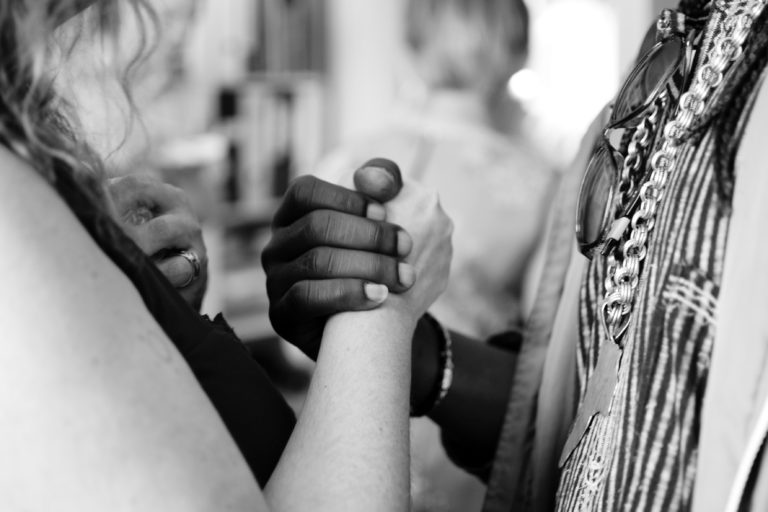My husband and I got into a fight. He yelled at me, I yelled back at him. And then, silence. For a full day. When we started speaking again, we didn’t talk about why we were mad at each other. Just swept it under the marital rug. To anyone else, we didn’t look or act like we were still seething inside. But we were.
I’ve been thinking a lot about unity. That’s what everyone wants, right? But what is it, and what’s the best and fastest way to get it?
As it so often does, history may provide an answer. The brutal system of apartheid held South Africa in its grip for years before being dismantled under the leadership of Nelson Mandela. While the decades-long system of racially-based segregation officially ended in 1994, the impact and remnants of it remain. But there’s little doubt that the country has come a long way toward narrowing the destructive, institutionalized and immoral divide that was apartheid. How’d they do it? I’m no historian, but a little research suggests that unity and reconciliation came only after full acknowledgement and understanding of what actually happened there.
The Truth and Reconciliation Commission in South Africa, chaired by Nelson Mandela, was a pioneering and successful effort to use truth, forgiveness and reconciliation to move beyond the violent conflict of apartheid in that country. And it’s a process that has since been used in more than 170 countries around the world. Based on the concept of restorative justice, it starts with facing the truth and telling the story of what actually happened. Next, participants go beyond the facts of the experience and share the hurt and pain caused by the conflict or event. It’s only then that the third element, forgiveness, can even be considered. Finally, the last stage is renewing or releasing the relationship: creating a new relationship or, if there is simply no going back, moving on from it by leaving it behind.
What resonates with me about this process is the fact that, without facing the truth and openly acknowledging the pain we’ve inflicted on each other, unity simply cannot happen. We can’t ignore truth, gloss over the facts of painful events or experiences and somehow hopscotch our way to unity.
I think about the American civil war fought over slavery and I wonder if, as a nation, we’ve ever fully faced the truth that our country was literally built on the backs of forced, Black, free labor. There are still schools teaching that the civil war was fought over “states’ rights,” ignoring the factual and painful reality that maintaining the system of slavery was the real cause of the conflict. Have we ever truly faced and acknowledged the pain of watching a son, husband or father being lynched? Or of our own government creating ghettos by instituting federal, state and local policies regarding where Black people could and couldn’t live? What about the humiliation of being turned away from a job for which you’re qualified, of being pulled over by a police officer or forced to use a different bathroom for no other reason than the color of your skin? Have we acknowledged the pain of unequal education, or of not even being able to send your children to college? As a white person, have I fully realized the harm that my Black, brown, yellow and red neighbors have faced when our very communities, economies, systems and laws have often been set up to let minorities know and to demonstrate, day in and day out, that they and their children, their grandchildren, and their great-grandchildren are somehow not worthy? That they are inferior, stupid, ignorant and less-than?
Is this the real cause of the extreme “political” divide in our country? If we as a country faced the truth of racism and how it has long been institutionalized and even embraced by some Americans, if we fully acknowledged it and recognized the hurt and pain that we, as white people, have caused minorities for generations—would they forgive us so that we might create a new relationship with them? What if we redefined ourselves not by skin tone but as people who share a love for this country? Who all want, as MLK said, for our children to be judged “not by the color of their skin but by the content of their character?”
If we continue to ignore the truths—all of them—about what divides us as Americans, we will never achieve unity. Calls for “bipartisanship” or “finding common ground” will be meaningless. Instead, what if each of us faced America’s “truths” by seeking out and understanding the stories of the harms that have happened in our country before, during and after its birth? That process, just like labor, is bound to hurt. A lot. But as any mother will tell you, the pain will be worth it. Even more so, that pain is absolutely necessary for us to forgive each other and form new, better and stronger relationships as citizens of this country we claim to love.
My husband and I eventually mended our most recent divide. But not before we faced the truth of why we were fighting and acknowledged the hurt we caused each other. Only then could we forgive and move forward with a renewed relationship. It’s a difficult, painful and humbling experience that made us stronger in the end. We’re under no illusions that we’ll never have another fight. There are times, especially during this COVID lockdown, when we are simply sick of looking at each other. But at least we know how to close the “gaps” in our relationship before they become cavernous divides.
Want unity? Then we must take the first step by facing the facts to find truth. Without it, unity is impossible, like sweeping hurt and pain under a rug, pretending everything is ok while we’re still seething inside. If we can’t or won’t be held accountable for the harm we’ve caused others, unity won’t happen. If we aren’t willing or able to ask for forgiveness, real unity will remain a pipe dream. A stronger, more unified America is going to take a lot of work and not just for the politicians in Madison or Washington, D.C. It needs to start with each of us.
Here are some suggestions on where to begin:
The Warmth of Other Suns, by Isabel Wilkerson
The Book of Joy, by the Dalai Lama and Desmond Tutu
Tears We Cannot Stop, by Michael Eric Dyson
And especially for Milwaukeeans and Wisconsinites, Evicted: Poverty and Profit in the American City, by Matthew Desmond.
Visit The Eviction Lab: https://evictionlab.org/
Other books, resources and/or ideas? Please share.
Photo by Aarón Blanco Tejedor, @healing_photographer, at unsplash.com


9 Comments
Really thought provoking, Jill. Thank you ~
I like some of these books, too — while fiction, lots of history and (for me) jaw-dropping realizations of pain and injustice:
Red to the Bone
Americanah
Small Great Things
Thanks Christy. I heartily endorse Small Great Things (haven’t read your other suggestions), especially if we want to understand how some seemingly normal people turn into white supremacists. The book does a terrific job, based on great and current research, of showing how that kind of recruitment can and is happening across America these days. And if we want to stop another insurrection from happening, we need to better understand how and why it happened in the first place!
Jill, this is all so true and doable!!The books are important ones to read and should be owned so one can return to them and make epiphany marks all over the pages.
Thank you caring.
Thank you for this message. I highly recommend reading Caste by Isabel Wilkerson. Changed my understanding of America completely.
Thank you for sharing these thoughts. Each day I wonder what act of kindness or act of anger will either join or tear our world further. Truth is challenging to see when your eyes are closed shut yet I want to believe that all of us want to end the pain and find a path forward for ourselves and the children. With hope and work, we can find a way forward.
Thank you, Jill. So hard, so necessary.
So true Jill. It struck me watching Biden’s town hall last night that an essential beginning is being honest with each other. It’s so refreshing and hopeful to have a leader that shares the complexity of problems vs. easy answers. He has true compassion for his fellow man regardless of their political stripe.
What you suggest is needed, takes a long view and willingness to do the hard work.
When we see our leaders taking risks to have honest conversations with us, it helps each of us to have the courage to do so as well.
Thank you for laying out what systemic change really takes.
I agree that each of us can and should own up to the underlying issues put in our minds and for some, hearts, from our past generations as we try to really let things go and move forward. I’ve said it before- we should be SO past his by now, and working on climate change and global health. But I’m stymied by how to get a sincere message out. Exactly to whom should be the recipient of the message so that it will be accepted, and sent by exactly whom, someone that would be believed? Is it high profile actors and athletes, (Denzel Washington & Tom Hanks; Kareem Abdul-Jabbar & Aaron Rodgers), as I don’t think anyone in politics would be considered reliable enough on either end. We need people involved on an international level that folks already trust. Not an easy question, but I guess we’re looking for modern day Messiahs. Anyone else thought about the “delivery system”? It’s time for this message to be heard, absorbed and embraced.
Really good questions, Mand–and from you, I’d expect nothing less! I think artists/creatives are doing their part in getting the message out. For instance, we just watched Judas and the Black Messiah the other night, and are only now beginning to understand the role our government (in that case, the FBI) has played in the persecution and the actual murder of Black Americans. As I noted, reading the work of Black authors, listening to multi-cultural music, all helps me to better understand the issues involved so that I can more effectively write about them. But think if all of us actively sought out and “spread the word.” For instance, I have a group of white friends who have agreed to begin reading, and discussing, books by Black authors. In other words, I’m suggesting a “ground up” approach in addition to the “top down” strategy you suggest. Sure, let’s have some well-known Messiahs spreading the word, as well as millions of lesser-known “Messiahs” all learning and sharing what they’ve learned. That seems to be the fastest way to move forward, as you propose.